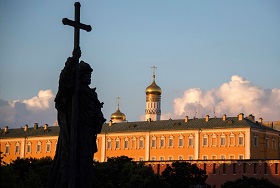In November 2020, the EU-Russia Expert Network on Foreign Policy (EUREN), a group of 40 eminent experts from different places in Russia and 14 EU member states, published four scenarios for the future of EU-Russia relations: A “Cold Partnership” in a multipolar world, where Russia and the EU ultimately return to extensive cooperation on issues such as climate change, digitalisation and visa liberalisation, while still facing major disagreements on European security. A “Descent into Anarchy” as former allies turn on each other in the wake of the devastating COVID-19 pandemic, backed variously by rivals Russia, the United States and China. Europe “On the Brink of War” as a reunited and rejuvenated West approaches military confrontation with a “Fortress-Russia”. A “Community of Values” uniting Russia in transition and a strong EU, in an international environment characterised by progress on conflict resolution in their neighbourhood and resurgent multilateralism.
A year ago, most of the 40 members of the network thought the “Cold Partnership” scenario most plausible. Little of what happened since November 2020 seems to points in this direction.
Russia and the EU currently seem to be nowhere near even embarking on a path towards “Cold Partnership”. For the time being the EUREN experts are proven right in their pessimism: at the end of our scenario exercise they were convinced that the EU and Russia will not be able to overcome their fundamental disagreements in the coming decade. Still, political leaderships on both sides bear responsibility for the future (not only) of Europe. While values and strategic goals will continue to diverge fundamentally for some time, maybe a long time to come, the sides should strive for small steps in specific areas to achieve at least some progress. Climate change is a good start. Mutual recognition of vaccination certificates should follow in order to let societies reconnect.
In November 2020, the EU-Russia Expert Network on Foreign Policy (EUREN), a group of 40 eminent experts from different places in Russia and 14 EU member states, published four scenarios for the future of EU-Russia relations: A “Cold Partnership” in a multipolar world, where Russia and the EU ultimately return to extensive cooperation on issues such as climate change, digitalisation and visa liberalisation, while still facing major disagreements on European security. A “Descent into Anarchy” as former allies turn on each other in the wake of the devastating COVID-19 pandemic, backed variously by rivals Russia, the United States and China. Europe “On the Brink of War” as a reunited and rejuvenated West approaches military confrontation with a “Fortress-Russia”. A “Community of Values” uniting Russia in transition and a strong EU, in an international environment characterised by progress on conflict resolution in their neighbourhood and resurgent multilateralism.
A year ago, most of the 40 members of the network thought the “Cold Partnership” scenario most plausible. Few believed that the EU and Russia were likely to see a “descent into anarchy” or end up “on the brink of war”. In other words, armed conflict was considered unlikely, but not ruled out entirely. Not one EUREN member believed in the possibility of a “community of values”.
However, even for a “Cold Partnership” to materialise in 2030, a lot would need to happen to change the negative dynamic of the relationship. The scenario suggests that the EU emerges from the Covid-19 pandemic stronger and more united. According to this narrative Brussels also takes a more pro-active stance, including on foreign and security policy. In Russia, a more active opposition prompts the political leadership to embark on certain economic and political reforms. This changes Moscow’s foreign policy rationale and opens a window of opportunity for more constructive engagement with the European Union, including on the Donbas conflict. Both sides are able to steer their relationship through the choppy waters of global US-Chinese rivalry.
Little of what happened since November 2020 seems to points in this direction. The first visit of EU High Representative for Foreign Affairs and Security Policy, Josep Borrell, to Moscow ended in a diplomatic disaster. This set the tone for the remainder of the year, including for the report on “pushing back, constraining and engaging” Russia, which Borrell presented to the EU heads of states and governments in June. A spat over domestic interference and spying spiraled between the Czech Republic and Bulgaria, on the one hand, and Russia on the other. As a result, the Czech Republic, together with the United States, ended up on a list of “unfriendly states” published by Moscow in May 2021. The EU and Russia continued to deeply disagree about the developments in Belarus after the fiercely contested presidential election in August 2020 and the Ryanair aircraft incident in May 2021. Frictions kept building up around the Donbas conflict, the Azov Sea and Crimea – thus further minimising the chances for the implementation of the Minsk agreement.
Tensions did not diminish between Moscow and Washington after the inauguration of US President Joe Biden. The first meeting between presidents Putin and Biden in June 2021 resulted in consequent diplomatic talks on strategic stability, cyber security and other issues. However, these consultations have not brought tangible results yet. All the contradictions on key issues remain. Moreover, Washington escalated its sanction policy around the Geneva summit. The Western withdrawal from Afghanistan was perceived in Moscow as yet another sign that US unilateral hegemony is coming to an end. But it also generated serious concerns about the security situation in the Central Asian region and has certainly done nothing to make the situation less complicated. Washington’s unilateral decision to withdraw from Afghanistan and the ensuing abrupt collapse of the government in Kabul frustrated many in the EU and cast a shadow over the revival of the transatlantic relationship. The same is true for Washington’s new AUKUS alliance. It remains unclear to date how the systemic rivalry between Washington and Beijing will evolve – and how it will impact on transatlantic ties, EU-Russia relations and European security in the coming years.
Last but not least, Russia and the EU have proved incapable to find meaningful ways of cooperation against the most imminent threat to humankind – the Covid-19 pandemic. Rather on the contrary, pandemic and vaccination policies added to the long list of issues that are contested between them. Furthermore, the pandemic has disrupted people-to-people contacts between the EU and Russia. Governments on both sides have yet to find a way to unlock this blockage, which in the longer run can become a real threat to peace and stability in Europe.
Internal developments do not give much ground for hope, either. Covid-19 and its economic implications will keep both sides busy and inward looking for some time to come. The result of the State Duma election on 19 September 2021 does not suggest an opening with regard to relations with the EU or domestic reforms. This is not likely to change in the run-up to the next presidential election, scheduled for 2024, and makes reforms unlikely in the near or medium term. Mounting frictions with various EU member states, but particularly with Germany, do not bode well for EU-Russia engagement in the coming months, perhaps years. The next German government, in formation now after the Bundestag election on 26 September, will probably continue on the more critical course Berlin has taken towards Russia over the past years. Angela Merkel’s departure from the Federal Chancellery will leave a large gap not only in relations between Germany/the EU and Russia, but also in Eastern Europe more generally. It remains to be seen if, when and how the next German government will be able to fill her shoes. Nord Stream 2 is bound to resurface and further complicate the German-Russian agenda. Emanuel Macron had to put up with Moscow’s indifference vis-à-vis his diplomatic charm offensive in 2019 and is not likely to repeat this exercise before or after France’s presidential election in May 2022.
On the more positive side, the EU and Russia have started to talk more seriously about climate change. Political approaches in this field are still far apart. But Russia is facing more and more serious implications not only of the implementation of the European Green Deal, but indeed also of climate change itself. This provides the sides with new starting points for cooperation.
Coming back to the EUREN scenarios, Russia and the EU currently seem to be nowhere near even embarking on a path towards “Cold Partnership”. For the time being the EUREN experts are proven right in their pessimism: at the end of our scenario exercise they were convinced that the EU and Russia will not be able to overcome their fundamental disagreements in the coming decade. Still, political leaderships on both sides bear responsibility for the future (not only) of Europe. While values and strategic goals will continue to diverge fundamentally for some time, maybe a long time to come, the sides should strive for small steps in specific areas to achieve at least some progress. Climate change is a good start. Mutual recognition of vaccination certificates should follow in order to let societies reconnect.
The abridged version of this article was published in Baltic Rim Economies publication on the website of Pan-European Institute of Turku School of Economics, University of Turku.
First published in the Valdai Discussion Club.








